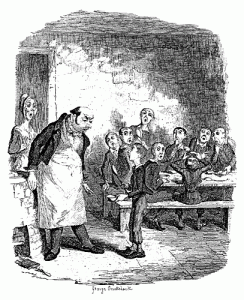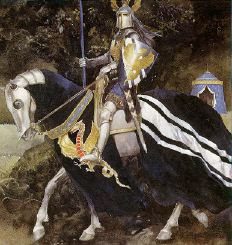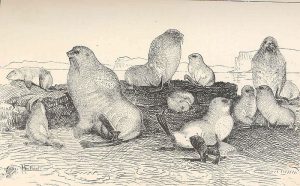Thanks everyone for all your messages about I Fear Me The Worm. Semantics is such an interesting topic! So I’m bowing to popular demand and blogging about the meanings of words again. As I showed last time, creativity can influence language development, as can scientific progress. But would it surprise you to know that society’s shifting values can also bring about language change, as can a society’s demise?
 For example, did you know that the word ‘starve’ originally meant simply ‘to die’, as in Chaucer’s ‘Troylus’:
For example, did you know that the word ‘starve’ originally meant simply ‘to die’, as in Chaucer’s ‘Troylus’:
[Christ] Vpon a cros oure soules for to beye
First starf, and ros, and sit yn heuene a-boue
(v. 1844)
Since then, the features of ‘hunger’ and ‘cold’ have been added to the word, such that it now has the more specialised meaning of ‘to die of hunger or cold’. Without a tardis, we cannot travel back in time to know for sure, but this change in meaning was most likely caused by a continual close association of ‘starve’ with these specific causes of death, the most common forms of death at that time, hinting at a society rife with poverty.
 Changes in the meaning of ‘bachelor’, ‘honest’, and ‘pretty’ can be similarly revealing about our society over time. The earliest definition of ‘bachelor’ is ‘a young knight not old enough to display his own banner, a novice in arms’. Yet its Modern English meanings include:
Changes in the meaning of ‘bachelor’, ‘honest’, and ‘pretty’ can be similarly revealing about our society over time. The earliest definition of ‘bachelor’ is ‘a young knight not old enough to display his own banner, a novice in arms’. Yet its Modern English meanings include:
- ‘one who has taken the first or lowest degree at a university’,
- ‘an unmarried man (of marriageable age)’, and
- ‘one of the young male fur-seals which are kept away from the breeding-grounds by the adult bulls’.
 All three modern definitions have the common feature of inexperience. So we can assume the word was once ‘generalised’ to encapsulate all these meanings (ie. ‘inexperience’ in general), then subsequently ‘specialised’ into two types of inexperience: inexperience in knowledge and inexperience in love. The word’s meaning of ‘inexperience in love’ was then ‘transferred’ from mankind onto young male fur-seals. But why?
All three modern definitions have the common feature of inexperience. So we can assume the word was once ‘generalised’ to encapsulate all these meanings (ie. ‘inexperience’ in general), then subsequently ‘specialised’ into two types of inexperience: inexperience in knowledge and inexperience in love. The word’s meaning of ‘inexperience in love’ was then ‘transferred’ from mankind onto young male fur-seals. But why?
Most probably because these changes complemented certain changes in society. As it became more important for people to show the qualities of goodness, rather than to aspire to become a knight per se (the once-believed epitome of goodness), so the word’s meaning changed. The ‘knight’ aspect of ‘bachelor’ was dropped and those qualities most associated with goodness (knightliness) became the word’s dominant meaning – namely honour through being chaste and learned. Scholarship slowly replaced fighting battles as the more honourable profession, then the notion of learning and inexperience was transferred onto fur-seals!
The word ‘honest’ developed in a similar way, reflecting society’s changing values. Its earliest meaning is:
‘held in honour, respectable, virtuous’
This would have involved, for example:
- adhering to what is right or to a conventional standard of conduct
- having nobleness of mind
- being truthful, loyal and chaste, and
- having moral excellence
But this changed around the seventeenth century and the word came to mean:
‘showing sincerity of character, not concealing’
To have ‘sincerity and be non-concealing’ simply involves being the same in reality as in appearance, which is a far less complicated affair than being honourable, respectable and virtuous, which tells us that seventeenth century society valued being truthful above adhering to convention and being nobler of the mind. As social values changed from one to the other, so did the word ‘honest’. Similar changes happened to the words ‘wit’, ‘gentle’, ‘lady’, ‘woman’ and ‘pretty’.
 The earliest definition of ‘pretty’ is ‘cunning, crafty, wily, artful, astute’. From about the fifteenth century it developed the meaning ‘clever, skilful’ and was a general epithet of admiration. Only much later did it come to its Modern English meaning of ‘having beauty without majesty or stateliness’, and this change reflected the era’s (at least literary) loss of admiration for cunning, its shift away from valuing people for their skill to valuing their outward appearance.
The earliest definition of ‘pretty’ is ‘cunning, crafty, wily, artful, astute’. From about the fifteenth century it developed the meaning ‘clever, skilful’ and was a general epithet of admiration. Only much later did it come to its Modern English meaning of ‘having beauty without majesty or stateliness’, and this change reflected the era’s (at least literary) loss of admiration for cunning, its shift away from valuing people for their skill to valuing their outward appearance.
Many might argue that shift is still continuing today and, with words like twerking, grinding, bling, mankini and sexting coming into existence, they might be right. My question to you is: if the creation and adaptation of words reveals who we really are as a society, what will future generations think of us?!






Thanks, Zena. Another great post! I read it while stitching more bling on to my mankini and I can honestly say that future generations will think we were pretty fly!
Ha ha! I hope so, Rob. Thanks for stopping by again!